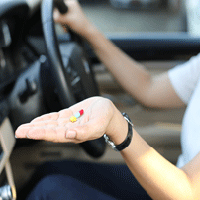Opioid Use & Car Accidents
March 20, 2019 Opioid abusers are found in every walk of life. That are also found driving on many of this country’s roads and highways.
Opioid abusers are found in every walk of life. That are also found driving on many of this country’s roads and highways.
More and more deadly car accidents across the United States are caused by drivers that are misusing these drugs, either with or without prescriptions.
Recent Published Studies
Accident Analysis and Prevention recently published an article by the Johns Hopkins Bloomberg School of Public Health that analyzed data from 2006 to 2017. It revealed that 10 percent of driver fatalities in the State of Maryland were partially caused by drivers that were impaired from opioid use. While this percentage has remained about the same, the national motor vehicle accident rates have been decreasing.
A second article that was published by Accident Analysis and Prevention stressed that law enforcement officials, residents, and drivers need to be aware of the prevalence of these types of crashes. Intoxicated driving from alcohol and other drugs is still a major safety concern, but opioid-related accidents should also remain a priority.
Safe driving advocates believe that these drivers should be held accountable if they cause these crashes.
A doctor from the Center for Injury Epidemiology and Prevention at Columbia University Medical Center is the co-author of a study published in Journal of the American Medical Association (JAMA) Network Open. He explained that when an individual takes prescription opioids and then drives, they have the equivalent a 0.05 percent blood alcohol content (BAC).
Vigilance is Needed
In Maryland, a 0.08 percent BAC equals driving under the influence. A 0.05 percent BAC is the level at which difficulties with concentration and coordination begin. It therefore makes sense that opioid-intoxicated drivers might exhibit some of the same driving behaviors as alcohol-intoxicated ones.
Other motorists and police should always be on the lookout for erratic drivers when they are on the roads. The JAMA article stated that a little over half of driving mistakes made by opioid-intoxicated motorists were failures to stay within their lanes. When a driver has taken opioids and also consumed alcohol, the risk of fatal car accidents is doubled.
The doctor also said that it is harder to test drivers for drug usage than alcohol when using field sobriety tests, largely because a breathalyzer cannot be employed. He added that some progress is being made, as certain states are working to improve their drug recognition protocols.
This could lead to better training to help law enforcement officials be able to determine if a driver is driving under the influence of opioids. The chief government affairs officer for Mothers Against Drunk Driving (MADD) said that police officers that are trained in drug detection could put this to good use at sobriety checkpoints.
Doctor Responsibility
It is also essential for doctors that prescribe opioids and other prescriptions to educate their patients. The possible effects of these drugs on driving abilities should be discussed; they should be considered as a risk of taking the drug, just like any other potential side effect.
Opioids can slow down reaction times, increase drowsiness, and affect the user’s judgement while driving. Physicians are in a position to explain these facts to their patients, but may not always do so when prescribing these drugs.
Baltimore Car Accident Lawyers at LeViness, Tolzman & Hamilton Represent Victims of Opioid-Use Related Car Accidents
If you have been injured by an intoxicated driver, whether that involved alcohol or drugs, prescription or illicit, the Baltimore car accident lawyers at LeViness, Tolzman & Hamilton will help you get the compensation you deserve. We will fight to maintain your rights as the victim of a car accident that was not your fault at all times. Call us at 800-547-4LAW (4529) or complete an online form for a free case evaluation today.
Our offices are located in Baltimore, Columbia, Glen Burnie, and Towson, allowing us to represent car accident victims in Maryland, including those in Anne Arundel County, Baltimore County, Carroll County, Harford County, Howard County, Montgomery County, Maryland’s Western Counties, Prince George’s County, Queen Anne’s County, Southern Maryland, and the Eastern Shore, as well as the communities of Catonsville, Essex, Halethorpe, Middle River, Rosedale, Gwynn Oak, Brooklandville, Dundalk, Pikesville, Nottingham, Windsor Mill, Lutherville, Timonium, Sparrows Point, Ridgewood, and Elkridge.






